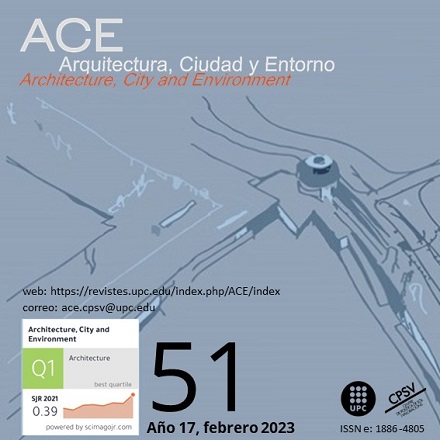POE in Pessac Oral Experiences. Model per a la comparació sistemàtica de casos d'avaluació post-ocupacional en habitatge
DOI:
https://doi.org/10.5821/ace.17.51.11801Paraules clau:
Philippe Boudon, Le Corbusier, entrevista, transformacióResum
L'Avaluació Post-Ocupacional (POE) examina l'efectivitat del disseny dels ambients ocupats per l'ésser humà. En 1969, Philippe Boudon va publicar el llibre Pessac de Le Corbusier, traduït posteriorment a l'anglès com Lived-In Architecture. Le Corbusier’s Pessac revisited. El llibre presenta una sèrie d'entrevistes als involucrats en el procés de disseny i als seus habitants i és considerat una fita de la POE. Nombroses publicacions de recerca han citat l'estudi de Boudon des de diferents perspectives, però no s'ha localitzat un text que analitzi el seu mètode sota la perspectiva de l'Avaluació Post-ocupacional. L'objectiu del present article és elaborar un diagrama per a la comparació de casos d'Avaluació post-ocupacional en habitatge i aplicar-ho per a l'anàlisi del mètode proposat per Boudon identificant les seves aportacions. La recerca s'estructura en quatre fases: Localització i selecció bibliogràfica entorn de l'Avaluació post-ocupacional en habitatge; Identificació de temes comuns en la bibliografia per a la caracterització dels mètodes de POE; Creació del model comparatiu de mètodes d'avaluació; Aplicació del model a l'estudi de Boudon per a corroborar el seu correcte funcionament. Com a resultat, s'ha identificat que Lived-In Architecture és una avaluació iniciada com a recerca, té una dimensió general i se centra en la perspectiva dels ocupants. Utilitza tècniques de comprensió retrospectiva i té lloc durant l'etapa d'operació dels habitatges amb l'objectiu de mesurar el seu rendiment, per la qual cosa es considera dins dels estudis d'Avaluació post-ocupacional investigativa.
Descàrregues
Publicades
Número
Secció
Llicència
| CRITERIS DE PROTECCIÓ INTEL·LECTUAL |
En aquest moment es compta amb la protecció de la Oficina Espanyola de Patents i Marques, mentre que la protecció global s'està tramitant davant la Organització Mundial de la Propietat Intel·lectual (OMPI/WIPO). Així mateix, la Oficina del Número de Sèrie Estàndar Internacional (ISSN) ha otorgat els següents números: 1886-4805 (versió electrònica) i 1887-7052 (versió en paper). |
| COPYRIGHT |
El contingut dels articles i els comentaris en ells expresats són responsabilitat exclusiva dels seus actors, i no reflexen necessariament la opinió del Comité Editor de la revista. Els treballs publicats per ACE queden sotmesos a la llicència CC BY-NC-ND 3.0 ES http://creativecommons.org/licenses/by-nc-nd/3.0/es/ La qual cosa vol dir que les persones autores només tenen i retenen els drets d'autor dintre de les limitacions imposades per la anterior llicència |





































